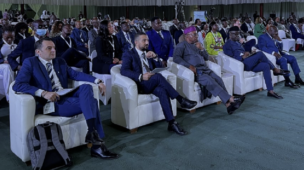Tempo de leitura: 3 minutos
As trade talk swirls and barriers go up, interest in Foreign Trade Zones is piquing once again. “We look at the FTZ as another tool in our arsenal,” said Raymond Anderson, with Orlando International Airport. “We believe foreign trade zones become increasingly valuable potentially to local businesses.”
The senior director of commercial properties and concessions, Anderson has spent the last two years growing the airport’s FTZ. The airport authority, he explained, is the guarantee or sponsor for the FTZ in Orange County.
Founded by Congress in the 1930s, foreign trade zones allow companies to import products into a designated area, waiving sometimes costly tariffs, until the product is finalized and re-exported. “It encourages domestic activity, particularly here locally. We’d rather have the activity on shore here as opposed to foreign competition,” Anderson said.
He explained that the airport’s FTZs, like Mitsubishi Hibachi who makes turbine engines, are economic drivers for the region, employing hundreds at their facility off West Sand Lake Road and South Orange Blossom Trail.
Another foreign trade zone with the airport, Disney Cruise Lines, imports items from around the world to have on cruise ship lines. There are hundreds of FTZs across the country, 21 in Florida alone, including at Port Canaveral in Brevard County.
“There’s quite a bit that happens behind the scenes,” said Jay Hood, whose American Cruise-Aid Logistics keeps cruise ships afloat. The company operating within the port’s FTZ allows cruise lines to offload cargo, like railing and carpet, storing in a huge warehouse until the ships are ready for them once again.
“The items that have the in bond, they’re kind of sitting here in a no clearance state,” he said. “It’s been slow growth, but as you can see now, we’re a bit full here.” Hood said that what he’s seen as of late is positive when it comes to trade.
But not all feel that way. “If all this between Trump and the rest of the world gets out of hand, commercially world trade will collapse. If world trade collapses, there won’t be quite so many people using free trade zones,” said James Bacchus. “Anything that discourages trade generally is going to harm tree trade zones.”
Bacchus, a UCF Distinguished University Professor of Global Affairs, practically wrote the book on foreign trade zones. As a Congressman, he pushed for them at the port and airport and just returned from a trip to China to discuss trade.
“The Chinese don’t understand why we’re acting in ways that not only violate international rules to which we agreed … but also why we’d be doing things so obviously not in our self-interest,” he said. Bacchus said that FTZs play an important role in trade with “a broader benefit in terms of the reverberations throughout the economy.” But the professor worries that history may repeat itself.
The last time the U.S. engaged in imposing steep import tariffs, other countries did the same: round after round of raising tariffs worldwide. Congress created FTZs in order to encourage trade after the high tariffs led the U.S. into the Great Depression.
“Economically, they need us and we need them. And it makes no sense whatsoever for the two of us to be engaged in any type of trade confrontation,” said Bacchus. “I hope that foreign trade zones will not be affected by the current needless confrontations.”
Meanwhile at the airport, Anderson said that business has not picked up yet. But, they just finished tallying their 2017 calendar year, showing an increased volume over 2016: $760 million dollars’ worth of shipments. “We’re trying to see how this all shakes out,” Anderson said.
At the port, Hood remains hopeful. “When President Trump started campaigning about higher tariffs in 2015, things started increasing,” he said. “We see more growth.”





Os comentários foram encerrados, mas trackbacks e pingbacks estão abertos.